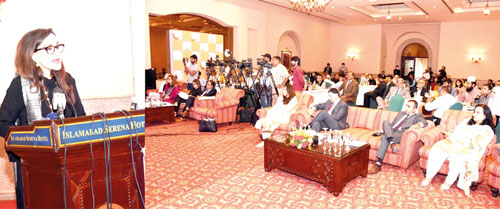Plastic pollution one of the most significant barriers towards environmental interventions
Zubair Qureshi
Federal Minister for Climate Change Senator Sherry Rehman, speaking at the 1st National Plastic Action Partnership Steering Committee & National Stakeholders Consultation workshop on Plastics Free Rivers and Seas for South Asia (PLEASE), addressed stakeholders from across the country and abroad on strengthening innovation and coordination of circular economy solution to plastic pollution flowing through Pakistan’s rivers mainly the Indus River.
The federal minister said that people were ingesting micro-plastics everyday through consumption of seafood, making it a crisis of our own creation that impacts our nutrition through plastic pollution.
Sherry called for an urgent need for creating incentives for the end users of single-use plastics in the society, as plastic pollution is one of the most significant barriers towards the on-going and future environmental interventions. The Minister emphasized, “While we can force penalties in some areas and ban single use plastics, penalties alone are not the solution. There won’t be a shift towards a plastic-free society no matter how much we speak about it or use the right jargon on the circularity of the economy if we don’t address the basic issues. In the near future, there will be more plastics in the seas than fish and Pakistan’s ocean and seas will be most exposed. Right now, we are in public-private partnerships with Coca-Cola to clean up the Malir River.
But these are cleanups and there are not the cycles that will lead to ridding our environment and our water bodies of the polluting plastics.”
“Law-making itself won’t be sufficient to tackle this and there is a need to create a better governance structure. Until we dis-incentivize the end user from using plastic and relentlessly educate the masses on the gravity of the issue, no actual change can be seen.”
The Federal Minister, while highlighting the urgency of the matter, said that “Pakistan is facing the largest climate event of the century as there is no example in living memory of 33 million people affected by a single catastrophe. While the country adapts to a very uncertain, contingent, and unpredictable future, plastics are going to complicate our adaptation process and will hurtle us towards a 3°C world.”









